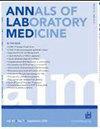6大语言模型临床决策支持评价:在RhD血型患者输血决策中的应用。
IF 3.9
2区 医学
Q1 MEDICAL LABORATORY TECHNOLOGY
引用次数: 0
摘要
大型语言模型(LLMs)具有临床决策支持的潜力;然而,它们在特定任务中的应用,如确定输血的RhD血型,仍未得到充分探索。因此,我们评估了六个llm在解决韩国医疗保健中RhD血型相关问题的准确性。方法根据真实输血场景,经专家审核,编制了15道选择题和真假题。用韩语和英语对6名法学硕士(Clova X、Gemini 1.0、Gemini 1.5、ChatGPT-3.5、GPT-4.0和gpt - 40)进行了两次问卷调查。结果与22名输血医学专家的表现进行了比较。对于特别具有挑战性的问题,应用提示工程,并重新评估问题。结果gpt - 40在韩语中准确率最高(0.6),与Clova X和Gemini相比差异有统计学意义(P <0.05)。在英语中,所有模型的结果都是相似的。输血专家取得了更高的准确率(0.8)。在接受即时工程的五个问题中,只有gpt - 40正确回答了一个问题,而其他模型都失败了。当同样的问题被重复时,所有LLM模型都改变了他们的回答,或者没有回应。结论sgpt - 40在所有模型中综合性能最好,可能对RhD血制品输血决策有一定的指导意义。然而,它的表现表明,它可能最好发挥支持作用,而不是作为主要决策工具。本文章由计算机程序翻译,如有差异,请以英文原文为准。
Evaluation of Six Large Language Models for Clinical Decision Support: Application in Transfusion Decision-making for RhD Blood-type Patients.
Background
Large language models (LLMs) have the potential for clinical decision support; however, their use in specific tasks, such as determining the RhD blood type for transfusion, remains underexplored. Therefore, we evaluated the accuracy of six LLMs in addressing RhD blood type-related issues in Korean healthcare.
Methods
Fifteen multiple-choice and true/false questions, based on real-world transfusion scenarios and reviewed by specialists, were developed. The questions were administered twice to six LLMs (Clova X, Gemini 1.0, Gemini 1.5, ChatGPT-3.5, GPT-4.0, and GPT-4o) in both Korean and English. Results were compared against the performance of 22 transfusion medicine experts. For particularly challenging questions, prompt engineering was applied, and the questions were reevaluated.
Results
GPT-4o demonstrated the highest accuracy rate in Korean (0.6), with significant differences compared with those of Clova X and Gemini (P <0.05). In English, the results were similar across all models. The transfusion experts achieved a higher accuracy rate (0.8). Among the five questions subjected to prompt engineering, only GPT-4o correctly responded to one, whereas the other models failed. All LLM models changed their responses or did not respond when the same question was repeated.
Conclusions
GPT-4o showed the best overall performance among the models tested and may be beneficial in RhD blood product transfusion decision-making. However, its performance suggests that it may serve best in a supportive role rather than as a primary decision-making tool.
求助全文
通过发布文献求助,成功后即可免费获取论文全文。
去求助
来源期刊

Annals of Laboratory Medicine
MEDICAL LABORATORY TECHNOLOGY-
CiteScore
8.30
自引率
12.20%
发文量
100
审稿时长
6-12 weeks
期刊介绍:
Annals of Laboratory Medicine is the official journal of Korean Society for Laboratory Medicine. The journal title has been recently changed from the Korean Journal of Laboratory Medicine (ISSN, 1598-6535) from the January issue of 2012. The JCR 2017 Impact factor of Ann Lab Med was 1.916.
 求助内容:
求助内容: 应助结果提醒方式:
应助结果提醒方式:


